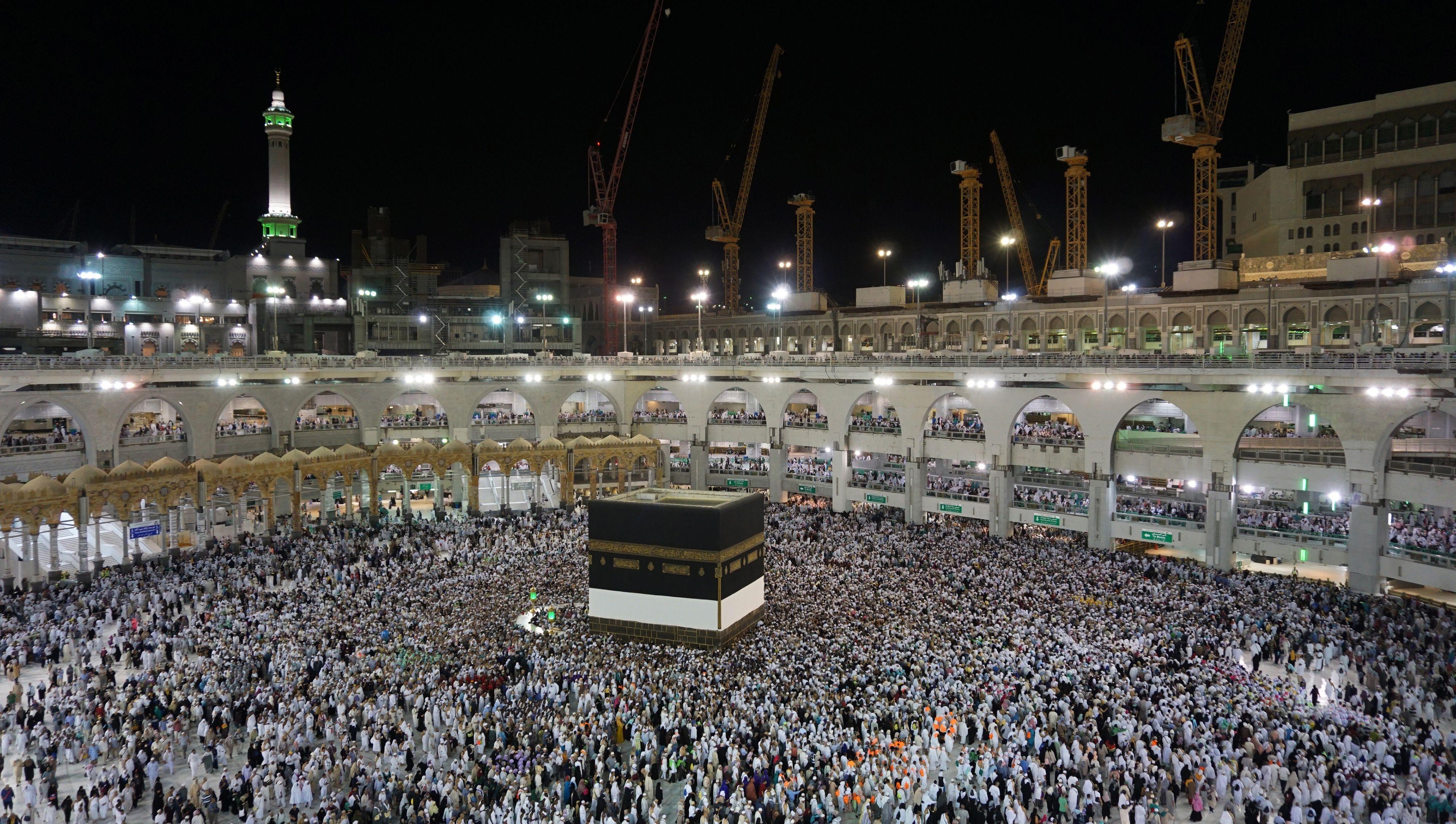


Extreme high temperatures during this year's Hajj pilgrimage in Saudi Arabia resulted in the death of more than 1,000 people, with the majority coming from Egypt. The Egyptian government has revoked the licenses of 16 travel agencies for helping unauthorized pilgrims reach the holy sites. While the Saudi government has not commented on the deaths, authorities have cracked down on unauthorized pilgrims and referred officials from the companies responsible for facilitating their travel to the public prosecutor for investigations.
Deadly Hajj Pilgrimage in Saudi Arabia: Background and Latest Developments
The annual Hajj pilgrimage to Makkah, Saudi Arabia, is one of the largest religious gatherings in the world, drawing millions of Muslims from around the globe. However, this year's pilgrimage was marred by tragedy, with more than 1,000 pilgrims dying due to extreme high temperatures.
Background
The Hajj pilgrimage is a mandatory religious obligation for all able-bodied Muslims who can afford it. It involves a series of rituals performed over several days, including circumambulating the Kaaba, the cube-shaped structure at the center of the Grand Mosque in Makkah.
The pilgrimage typically takes place in the Islamic month of Dhul-Hijjah, which falls during the summer months. This year, the pilgrimage began on August 30th and ended on September 4th.
Extreme Heat
This year's pilgrimage was particularly challenging due to the extreme heat. Temperatures in Makkah routinely exceeded 40 degrees Celsius (104 degrees Fahrenheit), with humidity levels often reaching 80%.
The extreme conditions put a strain on the health of pilgrims, many of whom were elderly or chronically ill. Dehydration, heatstroke, and other heat-related illnesses became common.
Government Response
The Saudi government has come under fire for its handling of the situation. Critics have accused the authorities of failing to take adequate measures to protect pilgrims from the heat.
In response to the criticism, the Saudi government has announced that it will set up cooling centers and provide pilgrims with more water stations. The government has also cracked down on unauthorized pilgrims, who are not registered with official tour operators.
Egyptians Most Affected
The majority of the pilgrims who died were from Egypt. The Egyptian government has revoked the licenses of 16 travel agencies for helping unauthorized pilgrims reach the holy sites.
The Egyptian government has also expressed condolences to the families of the victims and has called for an investigation into the deaths.
Top 5 FAQs
Q: What is the Hajj pilgrimage?
A: A mandatory religious obligation for Muslims to visit Makkah and perform a series of rituals.
Q: Why was this year's Hajj so deadly?
A: Extreme high temperatures and humidity led to heat-related illnesses among pilgrims.
Q: What was the government's response?
A: Set up cooling centers, provided more water stations, and cracked down on unauthorized pilgrims.
Q: What was the Egyptian government's response?
A: Revoked licenses of travel agencies involved in helping unauthorized pilgrims and expressed condolences to families of victims.
Q: What measures are being taken to prevent future tragedies?
A: The Saudi government has announced plans to improve cooling and hydration facilities and enforce stricter regulations for pilgrims.

A lone ISIS gunman ambushed a group of US service members and civilians in Syria, killing two and injuring three. The gunman was eventually killed by partner forces, confirmed by the US Defence Secretary. This is the first attack on US troops in Syria since the fall of President Bashar al-Assad. The casualties were transported to a nearby garrison and their identities will be withheld until their next of kin have been notified.

Pakistan's Prime Minister, Shehbaz Sharif, caused a major stir in Turkmenistan when he decided to gate-crash a meeting between Russian President Vladimir Putin and Turkish President Recep Tayyip Erdogan after waiting for 40 minutes. This impulsive move showcases Pakistan's increasing diplomatic insecurity and diminishing geopolitical clout. As Sharif struggles to secure meaningful engagements with major powers, he also faces domestic crises and is under the control of Army Chief Asim Munir. Meanwhile, the event in Turkmenistan marked a milestone for the country's declaration of neutrality and its efforts to maintain independence from both Western and Russian influence.

During an international forum in Turkmenistan, Pakistan's Prime Minister Shehbaz Sharif faced an embarrassing diplomatic moment as he walked into a private meeting between Russian President Vladimir Putin and Turkish President Recep Tayyip Erdogan. Sharif had been waiting for over 40 minutes for his scheduled meeting with Putin, causing him to enter the ongoing conversation between the two leaders. The incident, captured on video and shared by RT India, has triggered widespread mockery on social media with users making jokes about Sharif's actions. This comes as Pakistan attempts to strengthen its ties with Russia, while Putin maintains a closer relationship with India.

The latest bout of border fighting between Thailand and Cambodia has escalated, with hundreds of thousands of civilians displaced and casualties on both sides. The renewed skirmishes have shattered a ceasefire proposed by U.S. President Donald Trump in July. The leaders of both countries have promised to continue their aggressive stance, causing further tension and concerns for the safety of civilians. This has even resulted in the withdrawal of Cambodia's team from a regional sporting event.

Notorious Naxalite commander Ramdher Majji, along with his group, surrendered to the police in Chhattisgarh. This surrender marks a milestone in the fight against Naxalism, as the state's Deputy Chief Minister states that 80 percent of the menace has been eradicated. With the government's resolved aim to eliminate Naxalism by 2026, the country is heading towards a permanent solution to this long-standing issue. Home Minister Amit Shah also noted the significant progress made in reducing Naxal violence, with only 10 percent of the nation's population currently affected compared to 120 million people in the past.

After the tragic fire at their club in Goa, owners Gaurav and Saurabh Luthra have been detained in Thailand and are expected to be brought back to India soon. The Indian agencies have been in constant communication with Thai authorities and have managed to locate the brothers outside the main city area. With their detention, the process for their deportation has been initiated and Indian agencies are coordinating with Thai authorities for their return. The article also explains the general procedure for deportation of foreigners from Thailand under immigration laws.

Two years after the shocking death of Dawn Sturgess from Novichok poisoning, a public inquiry has released its final report. The report, overseen by retired Supreme Court justice Lord Hughes of Ombersley, examined whether British officials had taken adequate precautions to prevent the attack on ex-spy Sergei Skripal and his daughter Yulia in March 2018. The inquiry also investigated whether Ms. Sturgess's death could have been avoided with timely public warnings about abandoned objects. Good Morning Britain correspondent Richard Gaisford reported live from Salisbury, where the attack first came to light, to reveal the disturbing findings of the inquiry.

The Indian Air Force (IAF) has found a solution to maintain its aging Jaguar fleet by obtaining over 20 retired aircraft from the Oman Air Force. These jets will be dismantled and used as spares, as global production of Jaguar has ceased. With this transfer, India will become one of the few countries to still operate the Anglo-French supersonic attack aircraft. The collaboration between India and Oman in this regard reflects their robust defense partnership.

In a monumental decision, UNESCO has officially named India's beloved festival of lights, Deepavali, to its prestigious Intangible Cultural Heritage List during a committee meeting at the iconic Red Fort in Delhi. The news was met with joyous celebrations and performances, with Prime Minister Modi expressing his pride and noting the global impact of Deepavali's inclusion. This marks the sixteenth element from India to be inscribed on the Representative List, solidifying the country's rich cultural heritage.

India's festival of lights, Deepavali, has been added to Unesco's list of Intangible Cultural Heritage, following in the footsteps of Durga Puja. Prime Minister Narendra Modi expressed his delight at the nomination, stating that the festival is closely tied to India's culture and ethos. The nomination process for Deepavali involved diverse communities and experts, showcasing the festival's reach beyond the country, as it joins India's 15 elements already on Unesco's list.